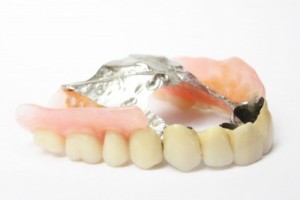Have you been caught in a situation where your denture dislodged during social interaction or have you experienced difficulty speaking? No one wants to be caught in such an embarrassing situation – unfortunately, this could happen to anyone who wears loose-fitting dentures.
Problems with Ill-Fitting Dentures
One should never underestimate the effects of loose dentures, as it can lead to oral and health problems.
- Soreness and ulcers – the uneven load placed on the gums can result in soreness or even ulcers, leading to chewing problems.
- Bone loss may be accelerated – the excessive pressure on the gums can also accelerate bone loss, leading to difficulty in using the dentures – they no longer fit!
- Oral Cancer – In more serious cases, the constant irritation of the gums may lead to the development of oral cancer.
- Increased risk of tooth decay – Denture wearers are also at higher risk of tooth decay and gum disease if proper oral care is not exercised since food can get stuck under the dentures or between the teeth and the dentures
- Malnutrition and vitamin deficiencies – Studies have revealed that those with ill-fitting dentures have a higher risk of developing diseases caused by malnutrition and vitamin deficiencies. They may be unable to chew certain foods such as meat (high in proteins), fruits and vegetables (high in fibers). Instead, they resort to a soft diet such as mashed potatoes, cakes and pastry, which are high in sugar content. The result is weight gain while not getting the necessary nutrients.
All these issues can be avoided if one has properly fitting dentures. If you are experiencing this problem, see your dentist for a proper diagnosis. In some instances, a new set of dentures may be made. In other cases, alternatives such as crowns, bridges and dental implants may be used to help patients regain oral health, function and esthetics.
New technology such as the Teeth-in-an-Hour implant procedure or Instant Implants may be suitable for those with missing teeth. Frequently, the addition of two implants and the provision of a good over-denture may make a significant difference to those with problem dentures.
Factors to bear in mind
The most important features of well fitting dentures are:
- support,
- stability and
- retention.
The dentures must feel comfortable with no pain while chewing. Speech and enunciation must be good as well. At any time, the denture wearer should not feel that the dentures are in danger of falling out of their mouth. Cosmetically, the denture must look good with proper teeth showing and providing lip support.
Denture Care Tips
Denture wearers should also take note that one denture does not last forever, as our gums and jawbone are not static. Both undergo changes and reduce in volume and dimension as we age. Since dentures are made of resin and are a foreign body in the mouth, they will not adapt to the changes. Over time, dentures will become loose and thus ill-fitting.
Visit your dentist and have your dentures checked and relined periodically, preferably every six months.
- Practice proper dental hygiene – rinse the dentures and mouth after every meal. The best practice would be to brush your teeth and dentures with a brush using some detergent (a good commercial denture cleanser can also be used) in order to ensure that the dentures are in a clean condition prior to storing in a glass of room temperature water.
- Dentures should not be worn to bed, this is to allow the oral tissue to rest.
- Do not use toothpaste to brush the dentures – teeth and dentures not made of the same material – what is beneficial to the teeth does not apply to the dentures
For more information on dentures or other treatment options to replace missing teeth, visit the Specialist Dental Group website.






